In the third year of the full-scale war with Russia, a large part of Ukrainian lands near the border is still in the hands of businessmen and local residents. For decades, officials have claimed that they are solving this problem, but until now the territory of the border does not fully belong to the state. Even more, after the invasion of Russia, the problem of the "private border" played with new colors.
The fact is that in February-March 2024, the Ukrainian authorities actively took up the construction of defensive fortifications on the part of Russia and Belarus. It would seem that during the war, the need for such works is an axiom. But new realities exposed an old problem - the presence of private lands along the Ukrainian borders.
According to the Ukrainian Air Force, in March, the landowners of one of the settlements in the Rivne region approached the group that was erecting fortifications and made an ultimatum: "We will not allow this, we will stand as a human shield!".
They tried to explain to the angry residents that the threat of a second invasion from Belarus has not disappeared and that it is necessary to prepare. But in this specific situation, logical arguments did not work. "We will meet them with white flags," was the response of the landowners.
The military and representatives of local authorities, with whom we spoke, do not rule out the aggravation of such conflicts, especially on the eve of sowing. And all because Ukraine has not resolved the issue of returning strategically important defense lands near the border to the state for decades.
What is a "private border"
The length of the Ukrainian land border is 5,368 kilometers. Almost 2 thousand kilometers - with Russia, more than a thousand - with Belarus. Borderlands also include lands with a width of 30-50 meters along the border, and near the border with Russia and Belarus - with a width of up to 2 kilometers.
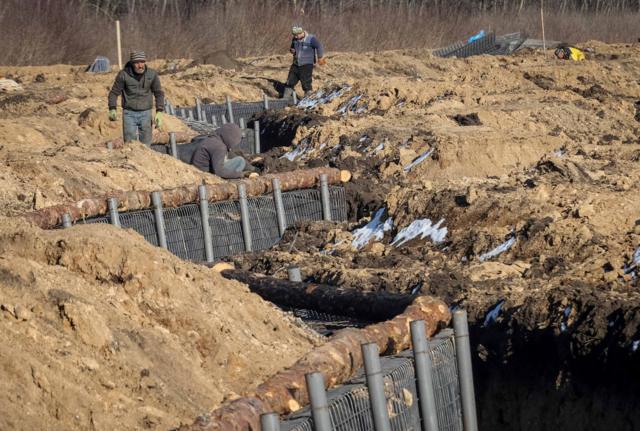
PHOTO AUTHOR, REUTERS Photo caption, Construction of defensive fortifications along the state border in Kharkiv Oblast, March 2024
But it so happened that a large part of these lands ended up in private ownership in previous years. On the Internet, you can find many reports about how the local authorities of the border regions transferred these lands to private hands free of charge.
This happened under almost all governments and presidents. Some decisions were later contested, others were turned a blind eye, but gradually the problem of the "private border" acquired a national character. And with this situation, Ukraine entered a full-scale war with Russia.
The fact is that despite the agricultural purpose of these lands, their owners did not always engage in gardening there. Conditions for smuggling and illegal migration were often organized in these territories - this "business" brought more money than agriculture.
"In practice, these private areas are a huge problem, because the owners of the land were able to organize their own corridors for illegal activities - illegal migration and smuggling," border guard Serhiy (name changed) tells us on condition of anonymity.
Some even posted their own guards at the border, had their own private security service and observation towers. In a conversation with us, Serhii immediately recalls the loud story of almost ten years ago with the "private border" in Transcarpathia.
Loudest scandals
In 2015, the country was stirred by the information that in Transcarpathia along the border with Hungary a fully functioning "private border" is not only guarded and engineering facilities are separate from the state, but separate rules are in force that have nothing to do with Ukrainian law.
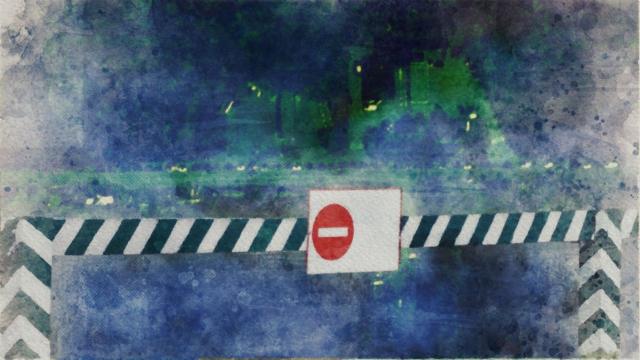
Land plots on the border line with a total length of about 150 km (for comparison, the length of the border with Hungary is 137 kilometers) were registered to different owners as agricultural land. Of course, no one sowed corn on them - these were smuggling checkpoints. Starting with cigarettes, weapons and drugs - ending with illegal migrants.
Ukrainian border guards did not have access to these areas. "Private owners installed observation towers there, where a practically parallel power structure operated, which worked not for the state, but for the land owner. Conflicts with the border guards often took place there, or the border guards themselves started working for them for bribes," says border guard Serhiy.
And although all those plots officially belonged to different people, the law enforcement officers attributed this "big farm" to Attila Horvat, nicknamed "Doki". He was called the "king of smuggling" and was suspected of controlling illegal flows from Transcarpathia to Hungary.
In November 2017, Ukrainian security forces organized a grandiose special operation against him.
"Doki" was effectively detained - with helicopters, armed special forces and publicity in the Ukrainian mass media. A criminal investigation was started against him, and in 2019 the case was brought to court, although Attila Horvat never ended up behind bars. In April 2020, he died in a road accident - he crashed on the Kyiv-Chop highway near Rivne. The lands controlled by Doki were returned to the state.
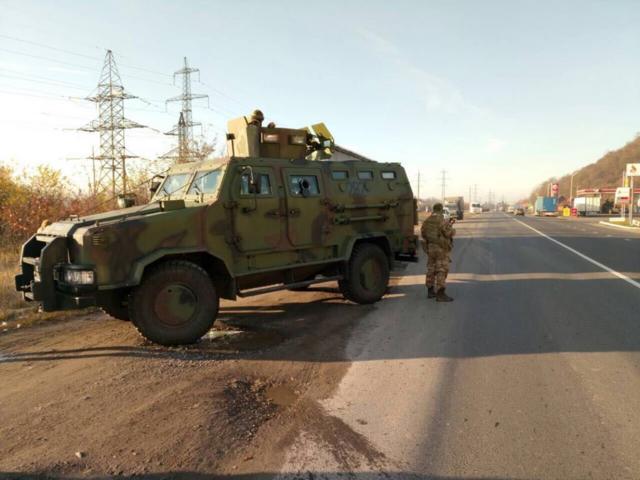
PHOTO AUTHOR, DPSU Photo Caption, Detention of the owner of the "private border" in Transcarpathia, Attila Horvat, in November 2017
Another scandal concerns the "private border" in the opposite part of Ukraine - in the Kharkiv region. Here, the control over the territories near the Hoptivka checkpoint in the Dergachy district is attributed to businessman, former head of the internal security department of the State Border Service, Vadym Slyusarev.
Low-level mass media called Slyusarev the "shadow curator" of President Volodymyr Zelenskyi's headquarters in the Kharkiv region, and also reported that his current firms were involved in investigations into smuggling. And although the businessman is still not even a member of the Servant of the People party, he did appear at joint events of Zelenskyi's team in Kharkiv during the election campaign.
So, during the second round of the presidential elections on April 21, 2019, at that time the head of Kharkiv's "Servant of the People", and already today People's Deputy Pavlo Sushko published a post with words of thanks: "This is only a small part of the team of Volodymyr Zelenskyi's Kharkiv headquarters! Thanks to our great Ze! Team!". Under this post, he posted a group photo of the team, in which there is a man in the background with two raised hands. This is Vadim Slyusarev.
Back in 2019, Volodymyr Zelenskyi told journalists that he does not communicate with Slyusarev, but admitted that he really helps Pavlo Sushka in Kharkiv. What exactly - the president did not specify. "He helps Pasha (Pavlo Sushko - Ed.). I know Pasha very well. Pasha is our face," Zelenskyy said in response to a question from a Radio Freedom journalist.
In 2021, the Kyiv Post and the Corruption and Organized Crime Investigation Project (OCCRP), referring to Romanian customs declarations that were in the hands of journalists, reported that the companies, which Slyusarev later became the owner of, had been smuggling Chinese cigarettes into the European Union for a long time . According to journalists, two Ukrainian companies - Duty Free Odesa LLC and Travel Retail Ukraine LLC, co-owned by Slyusarev, imported cigarettes of the Chinese brand Regina into Ukraine.
The law enforcement officers were engaged in this case, but the investigation did not establish the fact that Slyusarev himself was involved in illegal actions.
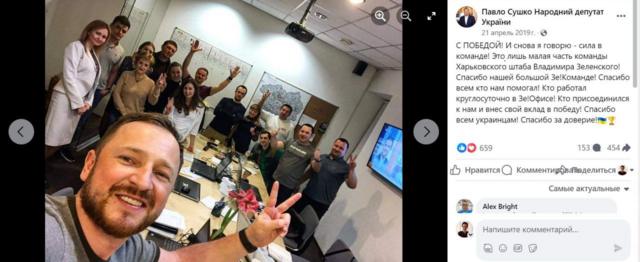
PHOTO AUTHOR, FACEBOOK PAVLA SUSHKA Photo caption, Vadym Slyusarev among members of President Zelenskyi's team in the Kharkiv region. He stands behind with his hands raised
Slyusarev himself denies all these accusations against him. He filed a lawsuit against the journalists and won the case at the end of last year. The court of first instance found the information about Slyusarev's involvement in smuggling to be unreliable. Journalists-authors of this investigation informed us that they have filed an appeal, the consideration of which is still ongoing.
As for the border lands, Slyusarev does not deny that he has such plots. His lawyer, Olena Bardina, told the Ukrainian BBC that her client is indeed the owner of land near the state border in Kharkiv Oblast. Two of his companies ("Frontera" LLC and "Tiera" LLC) own territory in the Dergachy district, which were used for economic activities.
But, the lawyer emphasizes, with the beginning of a full-scale war, the specified land plots were actually in the epicenter of hostilities, the institutions that were located there were destroyed, and the owner - Vadym Slyusarev - does not have access to them.
And Slyusarev insists that the state did not contact him regarding the transfer of these plots.
Olena Bardina assures: no state bodies, in particular the border service, did not contact the land owners regarding these border territories. "If there is such a need, the companies will not have any objections and are ready to provide any necessary assistance to the state," the lawyer said.
All information in the mass media about Slyusarev's involvement in smuggling is called unreliable by his lawyer. As well as his participation in the activities of the political party "Servant of the People" or close relations with the current leadership of the Border Service.
"In 2015, Vadym Slyusarev completed his service in the State Border Guard Service of Ukraine and since then has been exclusively engaged in entrepreneurial activity. He is not a public figure, not related to any political or public organizations and initiatives."
How much land is in private hands
Today, the problem of the "private border" takes on even more acute significance - the full-scale invasion of Russia continues, and therefore the challenges at the border have only increased. Plus, after the summer counteroffensive, which did not produce the expected results, the Ukrainian authorities began large-scale construction of defensive structures in the border areas, in particular in the north and east, in order to thwart possible aggressive plans of Russia.
The government allocated 20 billion hryvnias for the construction of high-quality concrete systems of fortifications and engineering barriers in 2024. All regions of the country were involved in these works, both civil and military structures participate in them.
Even before the full-scale invasion, in August 2021, at its meeting, the NSDC instructed the Cabinet to conduct an inventory of lands along the border and hand them over to border guards for permanent use. The owners of these plots were to be offered to sell the land to the state, and in case of disagreement, to forcibly remove it. But, according to our data, nothing has actually changed since that time.
The State Border Service told us that as of March 2024, it is necessary to set aside more than 23 thousand hectares of land near the border. But only 25% of this work has been completed.
More than 7,000 hectares are still in private ownership - this is like the area of the city of Cherkasy. Another 6,000 hectares are communally owned land. They must be alienated in order to place the border and engineering infrastructure. Of them, the border with Russia and Belarus accounts for a significant share - 4.4 thousand hectares.
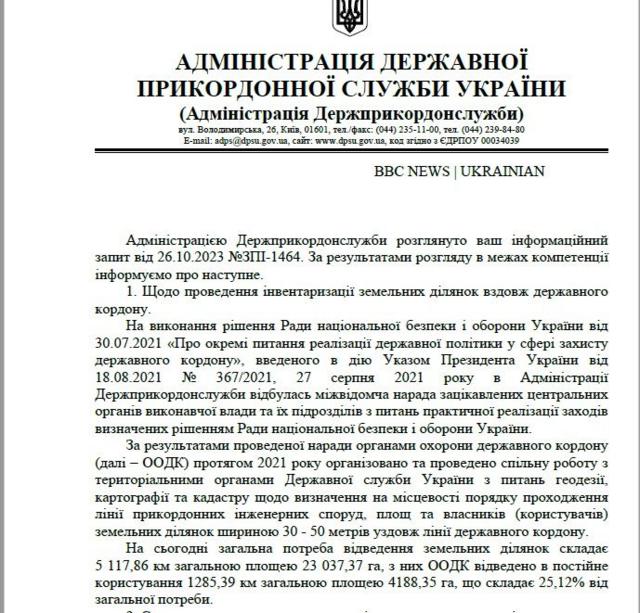
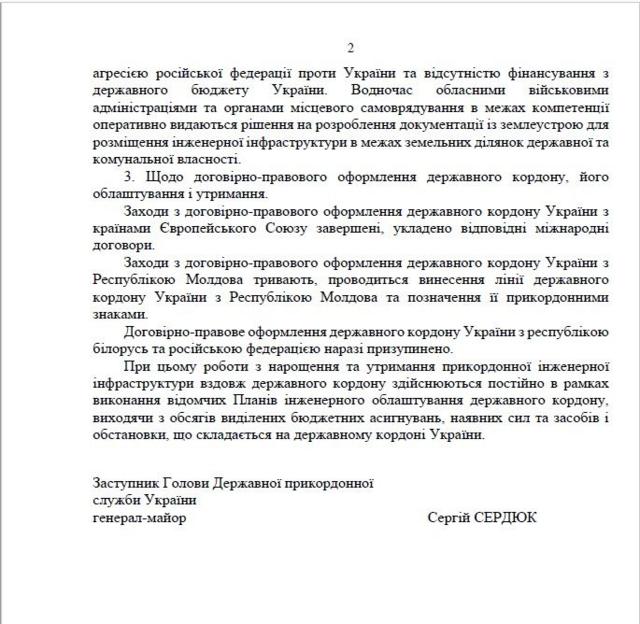
As the border guards explain, the regional administrations should be engaged in the purchase of plots, but they have not done it since the beginning of the great war.
"According to the letters of the regional military administrations, measures for the purchase and forced alienation of land plots in 2022 were not carried out in connection with the large-scale armed aggression of the Russian Federation against Ukraine and the lack of funding from the state budget of Ukraine," - the BBC reported in the department. These works were not carried out in 2023 either.
They admit that the most difficult situation is with private lands on the border. "Privately owned plots remain the most difficult issue, as this limits the possibility of their use in the interests of the protection and protection of the state border," explains Andriy Demchenko, the spokesman of the border agency.
According to him, it is impossible to install engineering barriers and structures on private land without the owner's permission, to lay roads for border patrols, and to place means of control and surveillance.
Courts are still ongoing in some areas, the prosecutor's office is trying to return previously illegally privatized lands to the state.
Work is being carried out separately to transfer the lands of the nature reserve fund to the border guards - it is a little more than 2,000 hectares. Expropriation of these plots is also a complex bureaucratic process, in which the central authorities are involved.
What to do with it
The law adopted on February 24, 2023 should put an end to this "eternal" problem. It was introduced by 40 deputies of the Council, led by former border guard of the Eastern Department, and now a deputy from "Servant of the People" Yury Zdebskyi. Their initiative was simple and maximally effective in theory - during the war, land for the needs of border guards can be taken without the permission of the land users.
It would seem that the Ukrainian border guards got all the necessary tools in their hands to finally take control of the border lands with a width of 2 km in the east and north (on the border with Russia and Belarus) and 30-50 m in the west. But in practice, not everything turned out to be so easy.
"With this law, we have closed the border," Zdebsky assures the BBC. He is sure that after the abolition of martial law, private lands will return to their owners. "When the war ends, these territories will be given to them, they will dig trenches and plant whatever they want there."
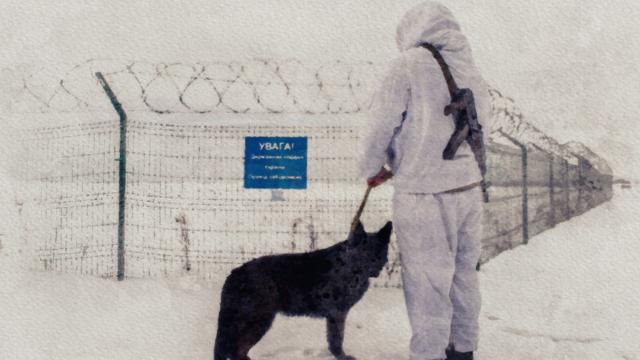
But people themselves are not always ready to wait. Especially - with the onset of spring sowing.
One of the officers of the Armed Forces, who supervises the process of setting up the defense lines in the north, says that the local residents are unhappy. Major conflicts have so far been avoided, but not everyone agrees that a trench should be dug or a DOT (long-term defense point) should be installed on their site.
"The arrangement is usually carried out by civil contractors. But since new lines of fortifications are now being built, this question will arise in the near future, when people will sow gardens and fields. I myself am interested in how it will be resolved," the soldier tells us.
The local authorities assure that the forced expropriation of land is still being worked out. "This issue needs a partial settlement, all relevant services are currently working on it. But this does not prevent the construction of fortifications in Chernihiv Oblast today," Vyacheslav Chaus, head of the Chernihiv Regional Military Administration, told the BBC.
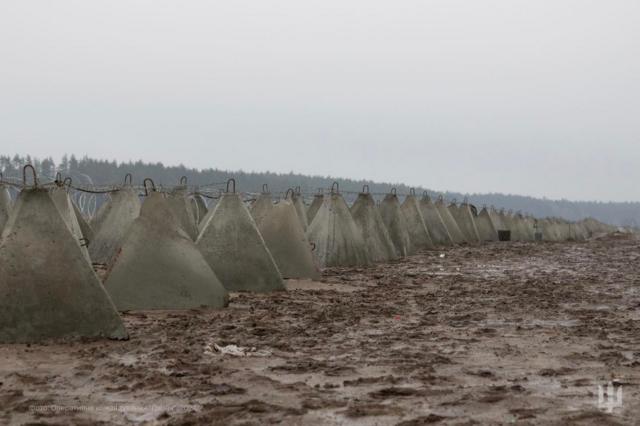
PHOTO AUTHOR, OPERATIONAL COMMAND "PIVNICH" Photo caption, In Chernihiv Oblast, as well as in other parts of the border with the Russian Federation and Belarus, since the beginning of spring, defense lines began to be erected rapidly. Fortifications are also built on private lands
"Today, the construction of fortifications is being carried out according to plan and there are no obstacles from the population and business," he emphasizes.
But we found out that the situation is not calm everywhere. According to the Ukrainian Air Force, in some regions there have already been recorded cases of disputes between landowners and servicemen who are building defense fortifications. People are threatening to protest because the state is building engineering facilities on their land.
Our sources in law enforcement agencies claim that the prosecutor's office is already working with "particularly recalcitrant" landowners. According to some sources, she received a non-public instruction from the authorities to activate this issue at the end of last year.
And although the authorities did not publicly announce the intensification of this work, recently news about the seizure of border lands began to appear more and more often on the websites of regional prosecutors' offices.
For example, the Kharkiv Regional Prosecutor's Office announced on March 11 that it managed to return 24.3 hectares to state ownership through the court, and on March 14 - another 16 hectares of land located along the Ukrainian-Russian border.
Chernihiv and Sumy prosecutor's offices also reported similar decisions.
According to the opposition, Ukraine did not prepare for the invasion of Russia, and therefore did not care about the serious arrangement of its borders.
Iryna Friz, deputy of "European Solidarity", member of the national security committee, says: "The threats are obvious, and the lack of fortifications along the entire border carries not only a security risk, but can also harm national security."
According to her, not all residents of the border area understand the situation and are ready to give their lands to the state, therefore decisive actions of the authorities are needed. She categorically rejected the government's explanation that getting rid of the "private border" is hindered by the war and lack of funding.
"I would like to emphasize that our partners warned President Zelensky long before the invasion began, and the first substantive conversations about the real threat began a year later. But, nevertheless, even with all the power in the country, Zelenskyi's team did not properly prepare the fortifications in the most vulnerable areas. It cost us many civilian and military lives."
The authorities are called to take responsibility and solve this issue. Russia's full-scale invasion has been going on for three years now, and today there are legislative mechanisms to return private lands to the state. The only question is whether there is political will for it.

